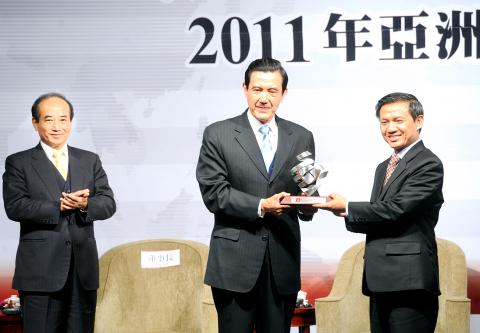Expanding democracy is only the effective strategy to eventually eliminate modern-day slavery and achieve human rights and social justice, the winner of the sixth Asian Democracy and Human Rights Award (ADHRA) said yesterday.
“It is not coincidence that a vast number of countries with good human rights records have a democratic system of governance” because it requires not only a top-down approach to implement national policy, but also the involvement of grassroots civil society to crack down on human trafficking, said Boat People SOS (BPSOS) executive director Nguyen Oinh Thang, whose group won this year’s ADHRA, in his acceptance speech before the Taiwan Foundation for Democracy (TFD) at the award ceremony in Taipei.
Founded in 1980, the national Vietnamese American community organization, has dedicated itself to assisting asylum seekers to resettle their lives in various countries through cooperation with state governments and non-governmental organizations worldwide.

Photo: Fang Pin-chao, Taipei Times
It also aims to build a solid civil society in Asia through direct intervention in individual refugee and human-trafficking cases and advocacy of law and fact-based policies in democratic countries that address how non-democratic governments suppress their people.
Having worked with countries including Russia, Japan, Canada, Philippines and many others, Thang said that he had never seen a country like Taiwan, which has such a strong determination and political will to combat human-trafficking and which has made so much progress in such a short time.
However, he said there was a long-standing problem in Taiwan concerning the lack of institutional protection for migrant workers employed as domestic helpers, saying Taiwan’s Human -Trafficking -Prevention Act (人口販運防制法) “has yet to protect the nursing and home care industry.”
Despite that, Thang said the efforts made by Taiwan in anti-human trafficking was highly recognized, saying that Taiwan has been placed in the “Tier 1” category of the US State Department’s Trafficking in Persons Report for the second year in a row.
The secret behind Taiwan’s successful story, Thang said, was cooperation and partnership between the government and anonymous individuals, as well as non--governmental organizations, in rescuing victims and enforcing the Human Trafficking Prevention Act.
In the early years of its establishment, BPSOS persuaded governments to launch coordinated efforts to fight pirates in the Gulf of Thailand and rescued more than 3,300 Vietnamese boat people at sea and brought them to safety.
In the early 1990s, as more governments established diplomatic ties with Vietnam’s communist government, despite its refusal to respect human rights and freedom, and redefined Vietnamese boat people as economic migrants rather than freedom seekers, BPSOS confronted this threat and advocated the internationally recognized principle of “non-refoulement,” which calls for the protection of refugees from return to countries where their lives or freedoms might be threatened.
Since 1999, BPSOS has fought the global explosion of human trafficking, especially in labor exports. With its headquarters located in the US, BPSOS now has 18 offices across the US, and four more in Taiwan and Southeast Asia.
Thang received a trophy from President Ma Ying-jeou (馬英九) and a US$100,000 cash prize from Legislative Speaker Wang Jin-pyng (王金平), who also serves as TFD chairman.
Ma praised Thang for his dedication and contributions to combating human-trafficking and reaffirmed his administration’s determination to continue to pursue human rights.
“Implementing human rights enshrined in the two UN human rights covenants has been one of the basic national policies of the country. When we have become a country that confers an award to others, we have to work harder,” Ma said.

Beijing could eventually see a full amphibious invasion of Taiwan as the only "prudent" way to bring about unification, the US Department of Defense said in a newly released annual report to Congress. The Pentagon's "Annual Report to Congress: Military and Security Developments Involving the People's Republic of China 2025," was in many ways similar to last year’s report but reorganized the analysis of the options China has to take over Taiwan. Generally, according to the report, Chinese leaders view the People's Liberation Army's (PLA) capabilities for a Taiwan campaign as improving, but they remain uncertain about its readiness to successfully seize

Taiwan is getting a day off on Christmas for the first time in 25 years. The change comes after opposition parties passed a law earlier this year to add or restore five public holidays, including Constitution Day, which falls on today, Dec. 25. The day marks the 1947 adoption of the constitution of the Republic of China, as the government in Taipei is formally known. Back then the Chinese Nationalist Party (KMT) governed China from Nanjing. When the KMT, now an opposition party in Taiwan, passed the legislation on holidays, it said that they would help “commemorate the history of national development.” That

Taiwan has overtaken South Korea this year in per capita income for the first time in 23 years, IMF data showed. Per capita income is a nation’s GDP divided by the total population, used to compare average wealth levels across countries. Taiwan also beat Japan this year on per capita income, after surpassing it for the first time last year, US magazine Newsweek reported yesterday. Across Asia, Taiwan ranked fourth for per capita income at US$37,827 this year due to sustained economic growth, the report said. In the top three spots were Singapore, Macau and Hong Kong, it said. South

Snow fell on Yushan (Jade Mountain, 玉山) yesterday morning as a continental cold air mass sent temperatures below freezing on Taiwan’s tallest peak, the Central Weather Administration (CWA) said. Snowflakes were seen on Yushan’s north peak from 6:28am to 6:38am, but they did not fully cover the ground and no accumulation was recorded, the CWA said. As of 7:42am, the lowest temperature recorded across Taiwan was minus-5.5°C at Yushan’s Fengkou observatory and minus-4.7°C at the Yushan observatory, CWA data showed. On Hehuanshan (合歡山) in Nantou County, a low of 1.3°C was recorded at 6:39pm, when ice pellets fell at Songsyue Lodge (松雪樓), a